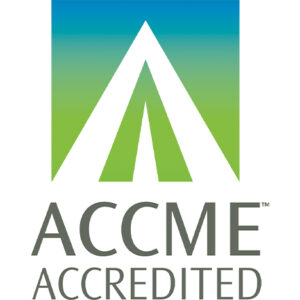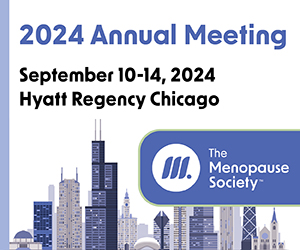Continuing Education
2024 Annual Meeting offers continuing education credits

Continuing Education
The 2024 Annual Meeting Main Program, Opening Symposium, and Menopause 101 and Sexual Health 101 courses offer opportunities to earn continuing education credits or certificates of participation by attending the events in person or by participating in the OnDemand virtual offering. For nurses and other learners who need to report contact hours of pharmacotherapeutic education, there also will be the option to earn pharmacotherapeutic credits.

The Menopause Society is accredited by the Accreditation Council for Continuing Medical Education (ACCME) to provide continuing medical education for physicians.
Submit for in person credit – CME credit only
Submit for in person credit – with pharmacotherapeutic hours
Learning Objectives
Menopause 101 Course
By participating in this activity, attendees should be able to
- Review menopause definitions, terminology, and adrenal physiology and discuss symptoms prevalent during each stage of menopause.
- Describe the basic physiology of vasomotor symptoms (VMS), racial and ethnic differences in symptomatology, and the hormone and nonhormone treatment options.
- Understand hormone therapy (HT) indications and contraindications, the types of HT available, and the timing hypothesis.
- Define female sexual dysfunction as it pertains to perimenopause and menopause, the available treatment options, and the indications for sex and pelvic therapy.
- Understand the basic physiology of genitourinary syndrome of menopause (GSM) and the hormone and nonhormone treatment options.
- Review mood, sleep, and cognitive changes during the menopause transition and management approaches for each.
- Outline the relationship between menopause and weight gain and the exercise and dietary recommendations.
- Explore the risk factors for cardiovascular disease and osteoporosis.
Cognitive-Behavioral Therapy 101 Course
By participating in this activity, attendees should be able to
- Review the foundations of cognitive-behavioral therapy (CBT).
- Outline the options for CBT in the treatment of menopause symptoms.
- Describe the role of CBT for sleep problems at midlife.
- Discuss how CBT can be used in treating sexual dysfunction at midlife.
- Understand how CBT can be incorporated into a clinical setting.
Annual Meeting Main Program and Opening Symposium
By participating in this activity, attendees should be able to
- Assess the role and ethics of artificial intelligence (AI) in midlife women’s health.
- Recognize and manage irregular bleeding during the menopause transition and review the near-term and future options for menopause management.
- Understand what causes depression during menopause and review cognition and hormone therapy use.
- Explore hair loss, immunization options, and bone health at midlife.
- Discuss healthy weight at midlife, the role of nutrition, and the recent treatment options for obesity.
- Appreciate the issues surrounding menopause and the workplace and review the options to assist employers and employees.
- Evaluate sexual health issues at midlife, including genitourinary syndrome of menopause and hypoactive sexual desire disorder.
- Become familiar with managing substance use during midlife.
- Discuss sleep disturbances in women with breast cancer and pharmacologic and behavioral approaches to treating menopause-associated insomnia.
- Consider the latest information on managing menopause and whether too much or not enough is being done.


